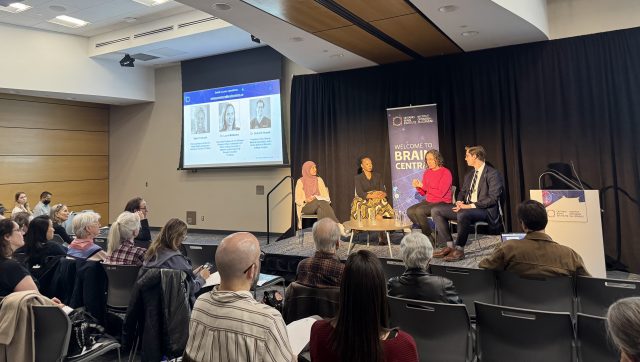Caring for someone with dementia is a long and challenging journey. Over the course of this disorder memory, cognitive function and other abilities deteriorate. Behaviour can also change over time in ways that are completely out of character for that person. For instance, the person with dementia may display aggressive behavior or get angry and act out. This can be very difficult as a caregiver and can lead to many questions. Is this typical? Is there something I can do to change this potentially risky behaviour? Getting these answers to caregivers is important for improving both care and safety in the home.
One place caregivers have been able to find answers to some of their questions is at the University Health Network (UHN) memory clinic. This January, Dr. Andrea Iaboni led a workshop at the clinic exploring behavioural changes in persons with dementia. She shared information about behaviour changes in dementia, as well as strategies and resources which could help. Here are a few key strategies she shared:
- Understand and address the cause of a behaviour rather than responding to the behaviour itself.
A key message in the workshop was looking past a behaviour to understand the cause behind it, or what it might mean. This enables caregivers to try strategies to meet the underlying need of the person. For example, someone with dementia could have a repetitive behaviour such as repeating the same question over and over. This could be due to anxiety related to something seeming uncertain or unpredictable. Thus, potential solutions could include maintaining a routine. Advanced warning of an activity could also reduce anxiety (depending on the timing and the person). Sometimes there is nothing that we can do about the cause of a behaviour. However, caregivers can still acknowledge the underlying feelings of anxiety or frustration. This can help the person with dementia by letting them know that they are heard and understood.
- Monitor behaviours to understand any triggers and evaluate interventions.
Monitoring behaviour is another important way to develop effective caregiving strategies. Medications, safety precautions and behavioural approaches should be monitored to see if they are achieving the desired result. Monitoring behaviour also allows these interventions to be adjusted or changed if necessary. Observing when these behaviours occur, if there are any warning signs, or if there are specific triggers for a behaviour can also help. Caregivers can use this information to predict, prevent, or mitigate a behaviour. These details also help clinicians make informed recommendations for different strategies and interventions.
- Evaluate the risk of a behaviour and your personal threshold for risk.
There are risks associated with both aggressive and non-aggressive behaviours. These risks depend on the person, the caregiver and their environment. Evaluating these risks and their importance to you will help you find the best strategy.
The risk of physical aggression depends on whether it is offensive or defensive. Defensive behaviours are more common, and certain strategies may help.
- Keep calm and remain supportive.
- Ask if you can help and suggest a specific action.
- Use short simple sentences.
- Be aware of your tone, body language and facial expressions.
- Acknowledge and validate their emotions.
Aggressive offensive behaviours are rare and can be related to symptoms like psychosis. In these cases action needs to be taken quickly to keep both the person and the caregiver safe.
There are also risks associated with non-aggressive behaviours, such as wandering. One possible cause of this behaviour can be an impulsive reaction to seeing the door. Camouflaging the door knob can reduce this impulsive trigger. Locking the door and posting a stop sign can also help deter this behaviour. You can also register the individual with Medic Alert, and the Alzheimer’s Society Safely Home program, as well as inform neighbours and local police. Addressing the causes behind the behaviour, which could be boredom or worrying about someone, is also important. Finally, you need to assess the risk with wandering and whether it is acceptable for the person and caregiver.
Caregivers are an important part of the care people with dementia receive. Their efforts make a world of difference in the quality of life that person experiences. However, every person is different. Thus, every caregiver must figure the best care strategies for their unique circumstances. Supports like this workshop series are small ways we can use knowledge and experience to help caregivers in their critical role. It may provide caregivers helpful strategies to address behaviour changes, answer practical questions they have, or reduce their fear and anxiety.
“It is so important for caregivers to see that they are not alone, and that their difficulties are shared by others. Talking about these symptoms is an important step to understanding and destigmatizing them. I hope caregivers found an encouraging message in my talk: there are some skills that they can learn and supports that are available to make life easier for them.”
Andrea Iaboni, University Health Network
Many other resources are available for caregivers through community organizations. This includes the Alzheimer’s Society, which offers personal support through their First Link program.
The workshop series is organized by Dr. Carmela Tartaglia, a clinician at the memory clinic and an Ontario Brain Institute (OBI) researcher focusing on neurodegenerative disorders such as dementia. The clinic is hosting two more workshops where caregivers can learn more about dementia and caregiving, connect with other caregivers, and ask their questions. If you would like to attend UHN’s next caregiver workshop on long-term planning, you can find more information here.


